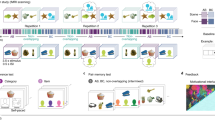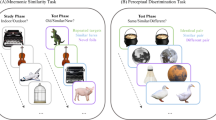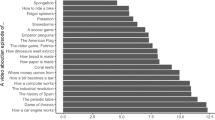Abstract
Contrary to the conclusions of Piaget, young children can make transitive inferences if precautions are taken to prevent deficits of memory from being confused with inferential deficits.
This is a preview of subscription content, access via your institution
Access options
Subscribe to this journal
Receive 51 print issues and online access
$199.00 per year
only $3.90 per issue
Buy this article
- Purchase on Springer Link
- Instant access to full article PDF
Prices may be subject to local taxes which are calculated during checkout
Similar content being viewed by others
References
Piaget, J., and Inhelder, B., The Child's Conception of Space (Routledge and Kegan Paul, London, 1956).
Piaget, J., Inhelder, B., and Szeminska, A., The Child's Conception of Geometry (Routledge and Kegan Paul, London, 1960).
Smedslund, J., Psychol. Bull., 71, 237 (1969).
Flavell, J. H., and Wohlwill, J. F., in Studies in Cognitive Development (edit. by Elkind, D., and Flavell, J. H.) (Oxford University Press, New York, 1969).
Author information
Authors and Affiliations
Rights and permissions
About this article
Cite this article
BRYANT, P., TRABASSO, T. Transitive Inferences and Memory in Young Children. Nature 232, 456–458 (1971). https://doi.org/10.1038/232456a0
Received:
Published:
Issue Date:
DOI: https://doi.org/10.1038/232456a0
This article is cited by
-
Memory reactivation in slow wave sleep enhances relational learning in humans
Communications Biology (2024)
-
Relational Discrimination Learning Using Multiple Stimulus Pairs with Different Colors and Color Regions in Pigeons
The Psychological Record (2023)
-
Developmental differences in memory reactivation relate to encoding and inference in the human brain
Nature Human Behaviour (2021)
-
Mutations in neuroligin-3 in male mice impact behavioral flexibility but not relational memory in a touchscreen test of visual transitive inference
Molecular Autism (2019)
-
Transitive inference in pigeons may result from differential tendencies to reject the test stimuli acquired during training
Animal Cognition (2019)
Comments
By submitting a comment you agree to abide by our Terms and Community Guidelines. If you find something abusive or that does not comply with our terms or guidelines please flag it as inappropriate.



